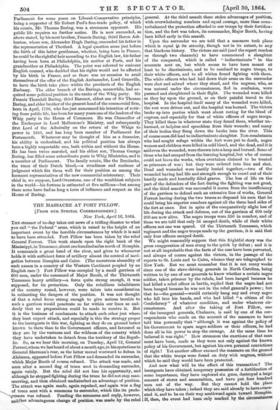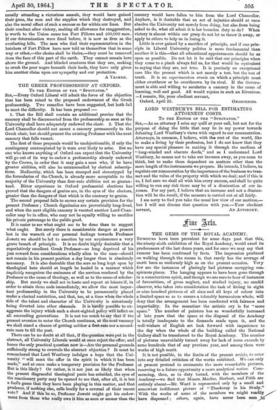THE MASSACRE AT FORT PILLOW.
[Fnoar OUR SPECIAL CORRESPONCE/311 New York, April 16, 1864. THE steamer of to-day takes out news of a trifling disaster to what you call "the Federal" arms, which is raised to the height of an important event by the horrible circumstances by which it is said to have been attended. Fort Pillow has been taken by the rebel General Forrest. This work stands upon the right bank of the Mississippi, in Tennessee, about onehundreclmiles north of Memphis. It commands a great bend of the river, and gives to whomever holds it with sufficient force of artillery almost the control of navi- gation between Memphis and Cairo. (The monstrous absurdity of each names in a country of the Western Continent peopled by an English race !) Fort Pillow was occupied by a small garrison of 600 men, under the command of Major Booth, of the Thirteenth Tennessee heavy artillery—a force quite strong enough, it was supposed, for its protection. Only the rebellious inhabitants of the country round, however, were taken into consideration in estimating the dangers of the position. It was not thought of that a rebel force strong enough to give serious trouble to such a garrison would penetrate so far within our lines so sud- denly that no preparations could be made to receive it. But it is the business of combatants to attack each other just where they least expect attack, and especially is this the strategy proper to the insurgents in this war, fighting as they do on ground better known to them than to the Government officers, and favoured as they are by the vastness and the wildness of the country which they have undertaken to detach from the territory of the Repub- lic. So, as we hear this morning, on Tuesday, April 12, General Forrest,whom we lastheard of about a month ago, in hisoperations in General Sherman's rear, as the latter moved westward to Selma in Alabama, appeared before Fort Pillow and demanded its surrender, which Major Booth of course refused. The attack was made, and soon after a second flag of truce sent in demanding surrender, again vainly. But the rebel did not lose his opportunity, and although he stopped fighting during the truce he did not stop man- ceuvring, and thus obtained undisturbed an advantage of position. The attack was again made, again repulsed, and again was a flag of truce sent with a summons to surrender, which like its prede- essors was refused. Pending the summons and reply, however, anzaher advantageous change of position. was made by the rebel
general. At the third assault these stolen advantages of position, with overwhelming numbers and equal courage, more than coun- terbalanced the protection afforded to our troops by their fortifica- tion, and the fort was taken, its commander, Major Booth, having been killed early in this assault.
Upon the surrender we are told that a massacre took place which is equal ial its atrocity, though not in its extent, to any that blackens history. The victors are said (and the report reaches us through two channels) to have commenced a slaughter of the conquered, which is called " indiscriminate " in the accounts sent on, but which seems to have been meant at least to be discriminate, and to be confined to negro troops, to their white officers, and to all whites found fighting with them. The white officers who had laid down their arms on the surrender were shot and sabred where they stood, and the negroes, who, as was natural under the circumstances, fled in confusion, were pursued and slaughtered in their flight. The wounded were killed as they lay upon the ground, or on their painful travel to the hospital. In the hospital itself many of the wounded were killed, the rest were driven: out, and the hospital was burned. The victors broke up into parties which went about raving for the blood of negroes, and especially for that of white officers of negro troops. They killed these in whatever state they found them, whether un- harmed, or helpless and speechless from their wounds ; and many of their bodies they flung down the banks into the river. This of course soon did lead to indiscriminate slaughter. Non-combatants who had sought refuge within the fort were put to death, negro women and children were killed in cold blood, and the dead, and it is said even the wounded, were thrown into a heap and burned. Some of those who had escaped from the burning hospital, but who of course could not leave the works, when overtaken claimed to be treated as prisoners of war; but they were ordered into line and shot.
Dead and wounded were hastily buried together,—two of the wounded having had life and strength enough to crawl out of their hastily made and hurriedly filled graves. The loss of life on the part of the defenders of the fort during the fighting was not great,
and the third assault was successful it seems from the insufficiency of the garrison to defend such an extensive line of works, General
Forrest having during the two traces so disposed his men that he could bring his superior numbers against all the three land sides of the fort at once. But in spite of the comparatively slight loss of life during the attack and defence, out of the garrison of 600 only 200 are now alive. The negro troops were 350 in number, and of these we are told that only 56 escaped death, while of their white officers not one was spared. Of the Thirteenth Tennessee, which regiment and the negro troops made up the garrison, it is said that only four officers escaped death.
We might reasonably suppose that this frightful story was the gross exaggeration of men stung to the quick by defeat ; and it is not at all improbable that the facts of the case have been perverted, and always of course against the victors, in the passage of the reports to St. Louis and to Cairo, whence they are telegraphed to New York. But we must remember that it is not many weeks since one of the slave-driving generals in North Carolina, being written to by one of our generals to know whether a certain negro soldier, taken prisoner by the rebels, had been hanged because he had killed a rebel officer in battle, replied that the negro had not been banged because he was not in the rebel general's power ; but that he—the general—would certainly hang any and every negro who fell into his hands, and who had killed "a citizen of the Confederacy" of whatever condition, and under whatever cir- cumstances. And after the taking of Fort Pillow, one of the insurgent generals, Chalmers, is said by one of the cor- respondents who sends on the account of the massacre to have told him personally that "although it was against the policy of his Government to spare negro soldiers or their officers, he had done all in his power to stop the carnage. At the same time he believed it was right." How strenuous the exertions of that man must have been, made as they were not only against the known policy of his Government, but against his own personal convictions of right! Yet another officer excused the massacre on the ground that the white troops were found on duty with negroes, without which he said they would have been protected.
And. now what will be the effect of this transaction? The insurgents have obtained temporary possession of a fortification of some importance, they have captured six guns, destroyed a large amount of stores and ammunition, and have put four hundred men out of the way. But they cannot hold the place which they have taken ; indeed they are said already to have evacu- ated it, and to be on their way southward again toward Memphis. If, then, the event had been only marked by the circumstances
usually attending a victorious assault, they would have gained their guns, the men and the supplies which they destroyed, and also the moral effect of such a success so far within our lines. But their conduct after victory, making all allowance for exaggeration, is worth to the Union cause ten Fort Pillows and 600,000 men. If our determination were fixed before, it is now as firm as the everlasting hills. The men who find their representatives in the butchers of Fort Pillow have now told us themseltes that in some way or other,—the choice shall be theirs,—they must be removed from the face of this part of the earth. They cannot remain here above the ground. And blinded creatures that they are, seeking to crush the poor negro beneath their heels, they have only given him another claim upon our sympathy and our protection.
A YANKEE.



































 Previous page
Previous page